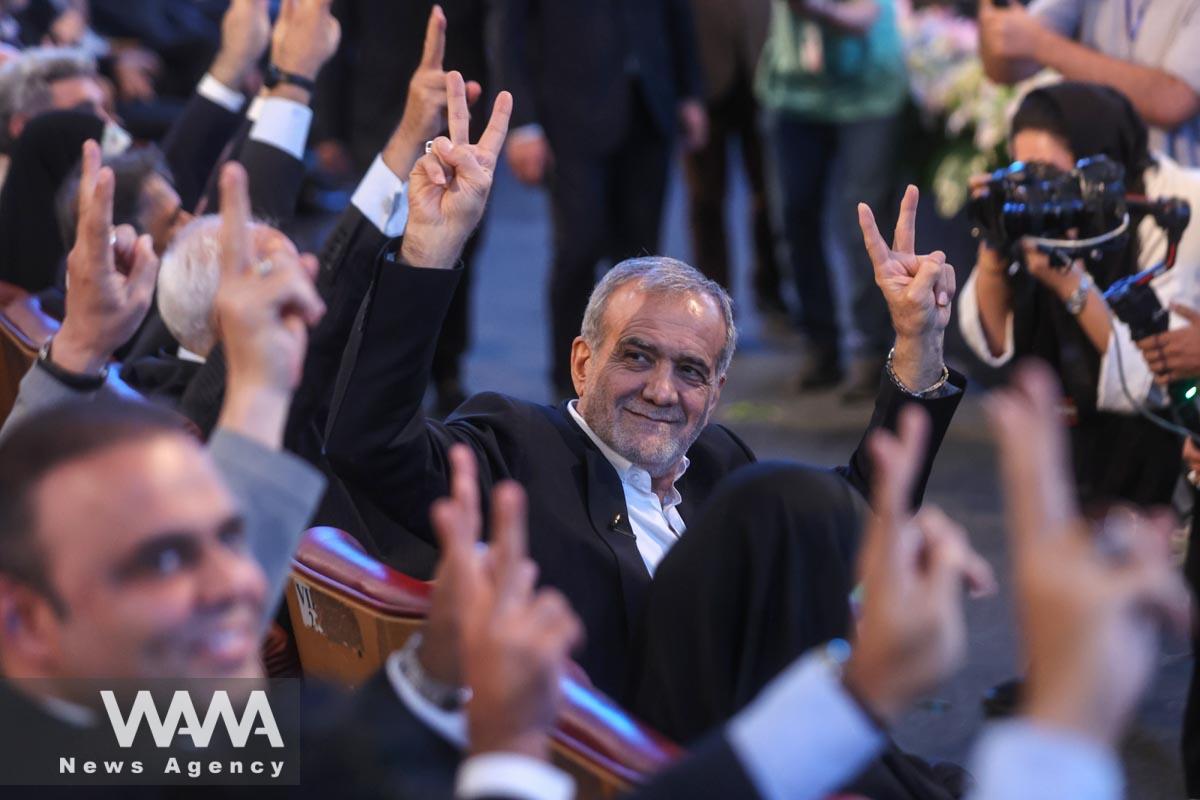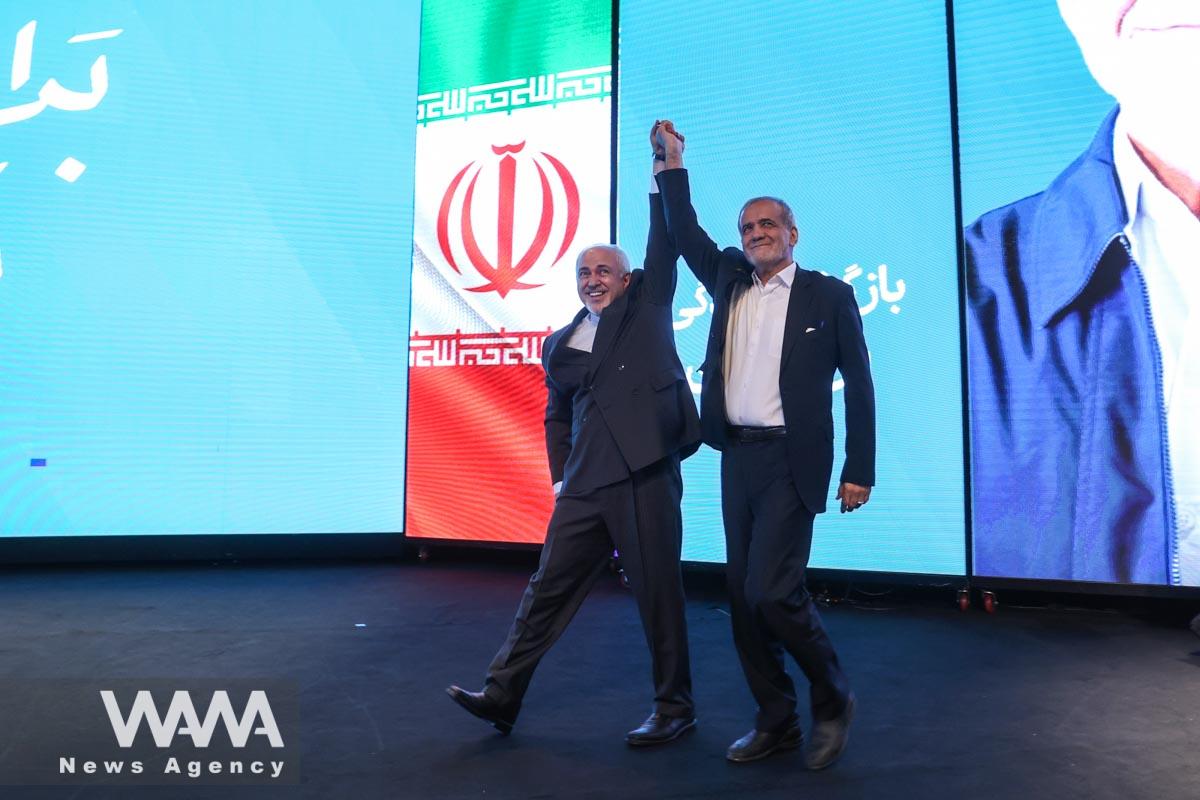The Alarm Bell of History Repeating Itself in the Elections
WANA (June 24) – In recent days, the publication of false statistics from opinion polls about the people’s chosen candidate and efforts to inflate the votes for a specific candidate have raised concerns. Comparing these with what is seen and heard in society and daily conversations, it becomes evident that many individuals, despite having reformist views, do not intend to participate in the elections.
It seems they are merely expressing their political stance in their opinions. Additionally, statements from some reformist politicians have created an undesirable atmosphere for the upcoming Iranian presidential elections. This raises the question: Is it possible that the story of the 2009 unrest is being laid out again, and bitter events await Iran?
In one such action, a few days ago, a clip of Mohammad Javad Zarif, the foreign minister of Rouhani’s government, now serving as a political advisor in Masoud Pezeshkian’s campaign, was broadcast. In it, Zarif excitedly said, “Next Saturday, July 9th, we will welcome President Pezeshkian,” creating a false enthusiasm among his supporters.
Even a slight familiarity with Iran’s political history brings back memories of 2009 when Mir Hossein Mousavi, the reformist candidate, announced his victory before the vote count was completed, leading to that year’s unrest.

Presidential candidate Masoud Pezeshkian shows the victory sign during a campaign event in Tehran, Iran June 19, 2024. Majid Asgaripour/WANA (West Asia News Agency)
The reformist political faction follows a nearly repetitive pattern in each election cycle. Consider these points:
1. The First Serious Stage of Electoral Competition: Registration
Many appear disinterested in participating in the elections, but in reality, they quietly prepare for electoral competition. This action has two main goals: first, to attract public attention and make their presence or absence seem crucial, and second, to draw the regime’s attention so that it accepts their conditions for participating in the elections, colloquially known as “buying their coyness.
” For example, before the approved candidates were announced in the current presidential election, the reformists issued a statement declaring they would only participate and support the elections if one of their endorsed candidates were approved.
2. The Second Serious Stage: Qualification Review
At this stage, the reformist faction claims unilateral oversight by relevant institutions, arguing that most of their candidates have been disqualified and have no chance of participating in the elections. This repetitive tactic has been seen again in recent days. One main goal of this action is to justify a possible defeat in the election.
3. The Third Serious Stage: Campaigning
During this stage, the reformist faction’s media strategy seems focused on two narratives for winning votes and discrediting the opposition (which, in their view, the former is contingent on the latter). The first narrative is the alleged “unified governance,” blaming all issues on this and presenting their presence in power as the solution.
The second is the narrative of the “inefficiency of past governments,” extensively highlighting weaknesses, emphasizing minor issues, and even attributing achievements to the previous government. This media operation aims to cover up their indefensible record in the eleventh and twelfth governments, the legacy of which continues to affect the people’s livelihoods.

Following in the footsteps of Rouhani, Iran presidential election
WANA (June 24) – Iranian social media has gone viral with a picture of Former Iranian president Hassan Rouhani tying a necktie for Reformist candidate Masoud Pezeshkian. This resembles the idea that the Pezeshkian administration will be “Rouhani’s third term.” Pezeshkian says, “I’m not the third Rouhani government,” his fellow Reformists try their best […]
4. Behavior Analysis of the Reformists
The reformist faction neither accepts electoral defeat nor handles victory gracefully. For instance, in 2009, this political faction did not accept defeat and propagated the “fraud lie,” later admitting that “fraud was the code word for chaos.”
Unfortunately, this political faction lacks the capacity to handle electoral victory. For example, after winning the presidential elections in 2013 and 2017, they claimed, “We don’t have enough authority and can’t accomplish anything.” This claim of “lack of sufficient authority” and tying everything to the JCPOA and FATF resulted in many missed opportunities over eight years.
The “fraud lie” and the “limited authority lie” are two sides of the same coin—the coin of dishonesty towards both the people and the government. Instead of repeating such behaviours, the reformist faction should respect the ballot box and the people’s will more.

Presidential candidate Masoud Pezeshkian and former Foreign Minister Mohammad Javad Zarif attend a campaign event in Tehran, Iran, June 19, 2024. Majid Asgaripour/WANA (West Asia News Agency)
Considering the current scenario, it is not far-fetched to think that the reformists are rewriting and repeating their behavioural patterns, potentially laying the groundwork for declaring electoral fraud and creating tension in the country. The Iranian people have already suffered greatly from this narrative of declaring victory and disrupting the game when the outcome is not favourable.
What awaits Iran could be a pre-planned program that repeats unpleasant events for the people. Some candidates should recognize the serious potential dangers to society and respond to such behaviours before they become troublesome, distancing themselves from radical figures.
Moreover, it is expected that the opposing party acts more wisely, avoiding further polarization, harsh criticisms of the opposition, and displays of power, as such behaviours could be exploited in this game.
By WANA writer: R.hejazi

Shifting Dynamics: A Wake-Up Call for Conservatives
WANA (June 22) – The third debate between the candidates for Iran’s presidential election was held amid heightened election fervor, attracting a larger audience. This debate focused on culture under the theme “Social Cohesion through Cultural Governance,” the candidates answered questions regarding women’s status in the country, the importance of their presence in society, governance […]












